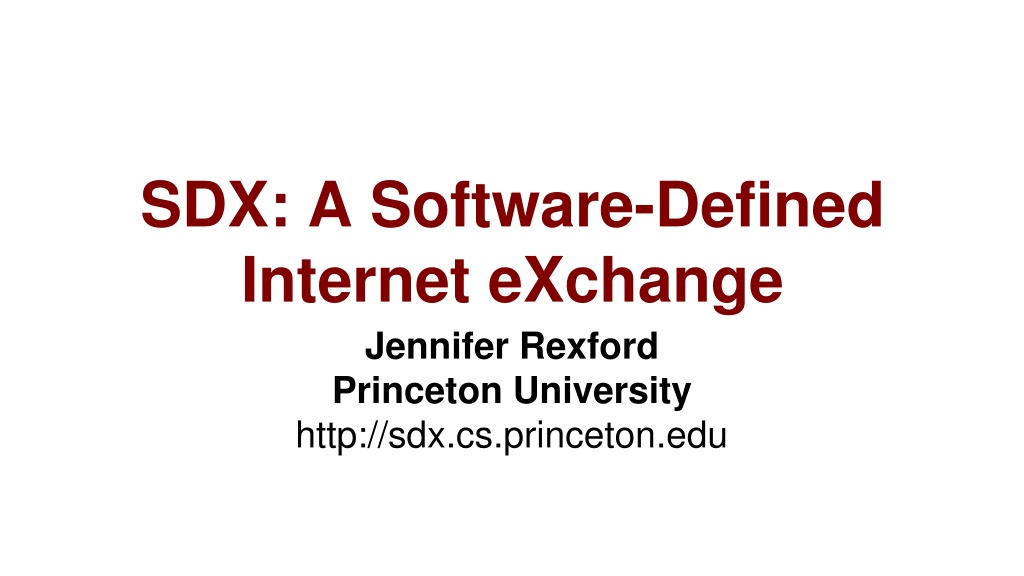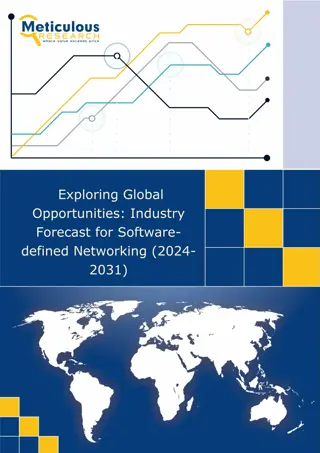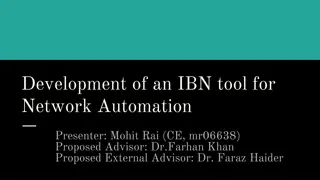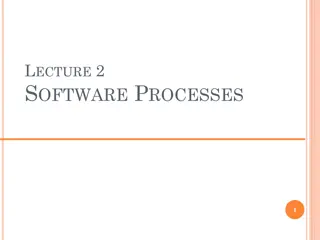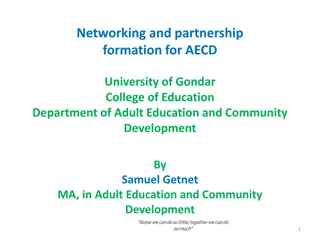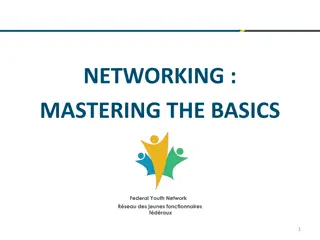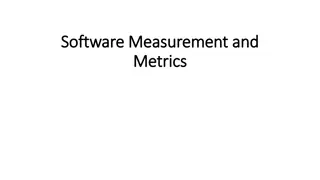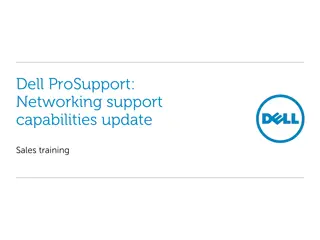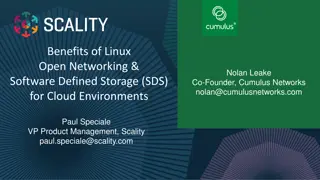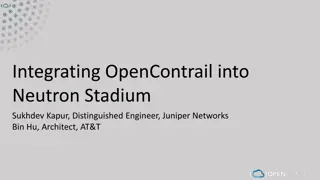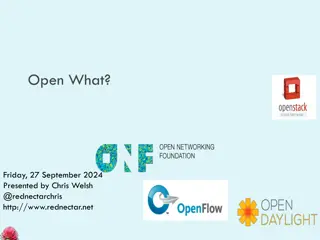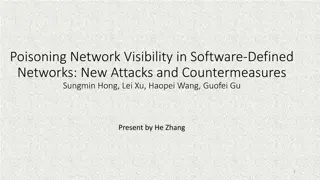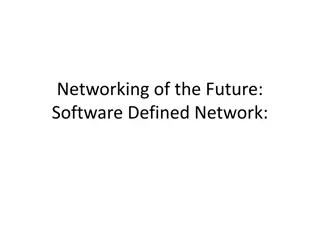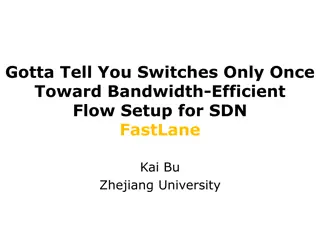Revolutionizing Networking with Software-Defined Innovations
Discover how Software-Defined Networking (SDN) and Internet Exchange technologies are transforming network infrastructure design, management, and interdomain traffic delivery. Explore the limitations of traditional routing protocols like BGP and the valuable wide-area services enabled by SDN, offering more control, flexibility, and efficiency in network operations.
Download Presentation

Please find below an Image/Link to download the presentation.
The content on the website is provided AS IS for your information and personal use only. It may not be sold, licensed, or shared on other websites without obtaining consent from the author. Download presentation by click this link. If you encounter any issues during the download, it is possible that the publisher has removed the file from their server.
E N D
Presentation Transcript
SDX: A Software-Defined Internet eXchange Jennifer Rexford Princeton University http://sdx.cs.princeton.edu
Software Defined Networking Changing how we design and manage networks Data centers, backbones, enterprises, But, so far, mostly inside these networks Network virtualization, traffic engineering, In this talk: Fundamentally change interdomain traffic delivery Starting with SDN at boundaries between domains 2
Wide-Area Traffic Delivery 4 3 5 2 6 7 1 ~50,000 Autonomous Systems (ASes) 3
Border Gateway Protocol (BGP) Interdomain routing on IP address blocks 4 3 5 2 6 7 1 Web server 12.34.56.0/24 4
BGP is Not Flexible Enough Routing only on destination IP address blocks (No customization of routes by application or sender) Can only influence immediate neighbors (No ability to affect path selection remotely) Indirect control over packet forwarding (Indirect mechanisms to influence path selection) Enables only basic packet forwarding (Difficult to introduce new in-network services) 5
Valuable Wide-Area Services Application-specific peering Route video traffic one way, and non-video another Blocking denial-of-service traffic Dropping unwanted traffic further upstream Server load balancing Directing client requests to different data centers Steering through network functions Transcoders, scrubbers, caches, crypto, Inbound traffic engineering Splitting incoming traffic over multiple peering links 6
Enter Software-Defined Networking Match packets on multiple header fields (not just destination IP address) Control entire networks with a single program (not just immediate neighbors) Direct control over packet handling (not indirect control via routing protocol arcana) Perform many different actions on packets (beyond basic packet forwarding) 7
Deploy SDN at Internet Exchanges Leverage: SDN deployment even at single IXP can benefit tens to hundreds of providers Without providers deploying new equipment! Innovation hotbed: Incentives to innovate, as IXPs on front line of peering disputes Growing in numbers: 350-400 IXPs ~100 new IXPs established in past few years 8
SDX: Software-Defined eXchange (SIGCOMM 14 paper) Arpit Gupta, Nick Feamster, Laurent Vanbever, Muhammad Shahbaz, Sean Donovan, Brandon Schlinker, Scott Shenker, Russ Clark, Ethan Katz-Bassett Princeton University, Georgia Tech, UC Berkeley, USC http://sdx.cs.princeton.edu 9
Conventional IXPs Route Server BGP Session IXP Switching Fabric AS A Router AS B Router AS C Router 10
SDX = SDN + IXP SDX Controller SDX BGP Session SDN Switch AS A Router AS B Router AS C Router 11
Prevent DDoS Attacks AS 3 SDX 1 SDX 2 AS 2 AS 1 12
Prevent DDoS Attacks Attacker AS1 under attack originating from AS3 AS 3 SDX 1 SDX 2 AS 2 AS 1 Victim 13
Use Case: Prevent DDoS Attacks Attacker AS1 can remotely block attack traffic at SDX(es) AS 3 SDX 1 SDX 2 AS 2 AS 1 Victim 14
SDX-based DDoS protection vs. Traditional Defenses/Blackholing Remote influence Physical connectivity to SDX not required More specific Drop rules based on multiple header fields, source address, destination address, port number Coordinated Drop rules can be coordinated across multiple IXPs 15
Inbound Traffic Engineering SDX Controller SDX AS A Router C1 C2 AS B Router 10.0.0.0/8 AS C Routers 16
Inbound Traffic Engineering Incoming Data C1 C2 AS A Router 10.0.0.0/8 AS B Router AS C Routers Incoming Traffic Out Port C1 Using BGP Using SDX dstport = 80 17
Inbound Traffic Engineering Incoming Data C1 C2 AS A Router 10.0.0.0/8 AS B Router Fine grained policies not possible with BGP AS C Routers Incoming Traffic Out Port C1 Using BGP Using SDX dstport = 80 ? 18
Inbound Traffic Engineering Incoming Data C1 C2 AS A Router 10.0.0.0/8 AS B Router Enables fine-grained traffic engineering policies AS C Routers Incoming Traffic Out Port C1 Using BGP Using SDX dstport = 80 match(dstport =80) fwd(C1) ? 19
Building SDX is Challenging Programming abstractions How networks define SDX policies and how are they combined together? Interoperation with BGP How to provide flexibility w/o breaking global routing? Scalability How to handle policies for hundreds of peers, half million address blocks, and matches on multiple header fields? 20
Building SDX is Challenging Programming abstractions How networks define SDX policies and how are they combined together? Interoperation with BGP How to provide flexibility w/o breaking global routing? Scalability How to handle policies for hundreds of peers, half million prefixes and matches on multiple header fields? 21
Directly Program the SDX Switch Switching Fabric A1 B1 match(dstport=80) fwd(C) match(dstport=80) fwd(C1) C1 C2 AS A & C directly program the SDX Switch 22
Virtual Switch Abstraction Switching Fabric Virtual Switch Virtual Switch AS B AS A A1 B1 match(dstport=80) fwd(C) Virtual Switch AS C match(dstport=80) fwd(C1) C1 C2 Each AS writes policies for its own virtual switch 23
Combining Participants Policies Switching Fabric Virtual Switch Virtual Switch AS B AS A A1 B1 p match(dstport=80) fwd(C) Virtual Switch AS C match(dstport=80) fwd(C1) C1 C2 Synthesize: match(inport=A1 & dstport=80) fwd(C1) 24
Building SDX is Challenging Programming abstractions How networks define SDX policies and how are they combined together? Interoperation with BGP How to provide flexibility w/o breaking global routing? Scalability How to handle policies for hundreds of peers, half million address blocks, and matches on multiple header fields? 25
SDX Platform Running code with full BGP integration Github available from http://sdx.cs.princeton.edu SDX testbeds: Transit Portal for in the wild experiments Mininet for controller experiments Exploring deployment opportunities Princeton, DOD/IC, GENI, SOX, Internet2, ESnet Regional IXPs in US, Europe, and Africa 26
Conclusion The Internet is changing New challenges for content delivery Increasing importance of IXPs SDN can let providers innovate New capabilities and abstractions Next steps Operational deployments Additional SDX applications Distributed exchange points 27
